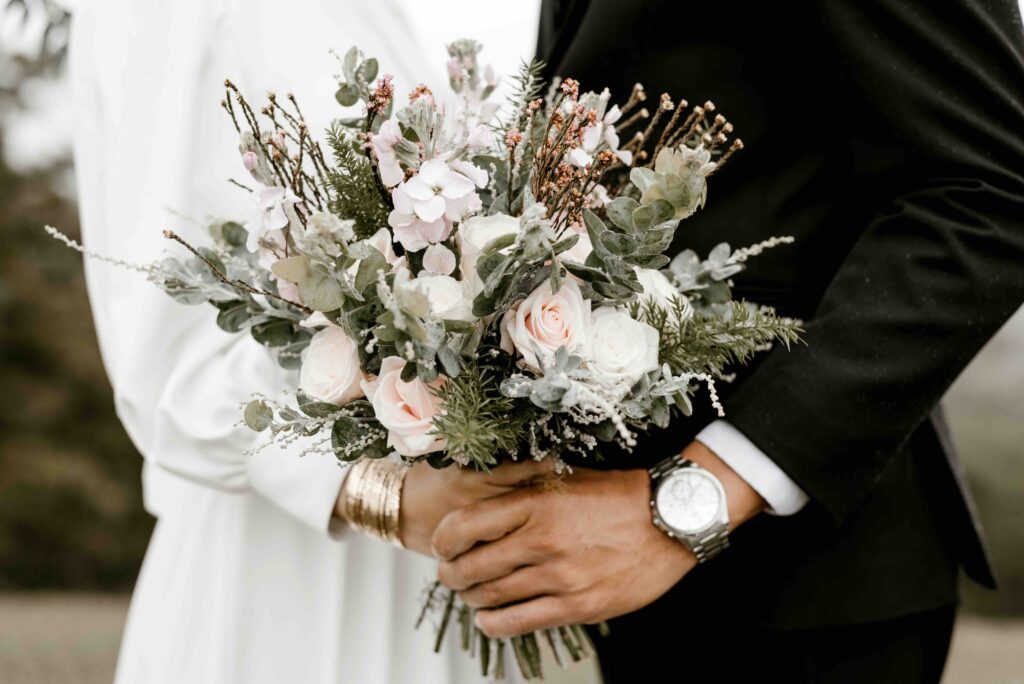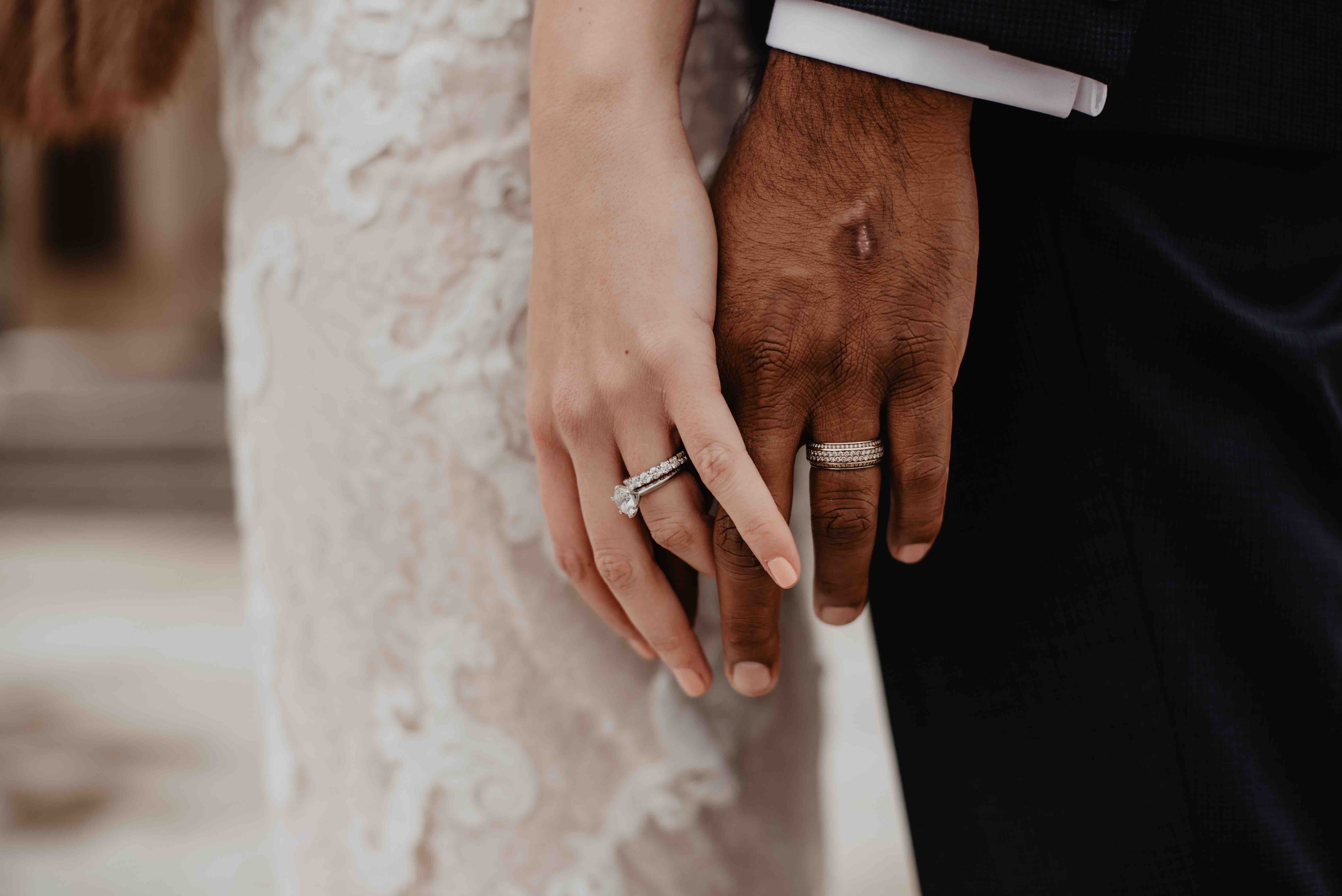Mixed marriages are sometimes romanticized, idealized, or, on the contrary, dispraised and misunderstood… This can be a very sensitive subject for certain families, or people of all cultures. Being from a mixed marriage, and also being in a mixed marriage, I learned a lot about this subject. I wanted to address this topic to put an end to some misconceptions. Of course, this is a personal point of view. All mixed marriages are different. It depends on the countries of origin, the personality of the people involved, the behavior of their family, etc. A mixed marriage can be a difficult ordeal or a beautiful journey. Or even both at the same time.
But, first, what is an intermarriage? A mixed marriage is a marriage between people of different ethnic origins or religions. In this article, I will only talk about marriages between people of different ethnic origins. Why? Because I believe that a marriage can only work if both of the partners share the same religion. I think both life partners must have the same beliefs to have a peaceful and constructing relationship and a consistent education for their children.

CHALLENGES of mixed marriage
1. Cultural misunderstanding
Culture can have a huge impact on a couple. Of course, it’s everyone’s choice to give more or less space to culture. However, certain aspects are very anchored in individuals and cannot be removed or with great difficulty. Some cultural aspects are not an issue, and some traditions are simply beautiful, without any toxicity. But, sometimes, culture is not a “friend”. Certain cultural aspects are difficult to understand for another person who doesn’t have the same origin. This can drift apart the couple.
Cultural differences can vary greatly. If both partners grew up in the same country, they are less prone to culture shock. They went to the same schools, watched the same movies growing up, understand the humor and the jokes of each other… But if they grew up in completely different countries, that’s another thing. My husband grew up in Iran, and I grew up in France. At first, it was difficult to adapt to everyone’s mentality. Additionally, a mixed marriage may be easier if the partners come from countries with similar cultures. A Moroccan-Algerian couple will have less cultural gap than a Swedish-Indian couple, for example.
How to bridge the cultural gap
When there are aspects of culture that cause disagreement, the couple should prioritize their religion. Culture should not go against the couple’s beliefs. If your partner’s culture doesn’t conflict with your beliefs, you need to be open to it. Learning your partner’s culture is very important. Even if you don’t understand it, it’s a way to connect more deeply with your partner. It is also a sign of respect towards his/her family. Both partners must make an effort, and no culture should be considered inferior to the other.
Impacts on mixed children
Parents should teach their own culture to their children if it does not contain any toxicity. A mixed child must know and understand their country of origin so as not to feel like a foreigner there. Both cultures must be taught equally so that the child enjoys their ethnic diversity. When the child lives in both cultures, he will be proud of his origins. Parents can organize events to celebrate certain traditions with friends and family members who already incorporate these cultural aspects into their lives. Thus, the child will assert his multicultural identity and will not allow himself to be defined by others.
2. Languages differences
It is very important to share a common language with your partner. Already, when two partners share the same language, there can be communication problems and misunderstandings. But, if you don’t share a language that you can speak easily, communication can become very difficult. And communication is one of the most important aspects of a marriage.
How to overcome the language barrier
If one partner speaks a language that the other doesn’t understand, but they have a common language, it’s easier. In this case, as a sign of respect, both partners must be willing to learn each other’s language. You don’t need to speak fluently, but even if it’s just a few words or sentences, it allows you to establish a strong bond with your partner and your in-laws. They will see the effort made and appreciate it.
It can be hard for a partner to not participate in conversations with their in-laws due to the language barrier. Some languages are very difficult to learn and require years of intense study, and most adults don’t have much time for this. Thus, the other partner must try to translate and build a relationship between their spouse and their family.
The consequences for mixed children
It’s necessary for the parent who speaks another language to teach it to their children from an early age so that they will speak it fluently later. If the parent speaks daily in their language to their children from birth, they will learn very easily. The parent can also read stories in their languages etc. This is fundamental so that the child can communicate with his family. It is also essential for building their identity. My father never taught me the Tunisian dialect, and I always felt like a foreigner in Tunisia because of that. I was unable to communicate with some members of my family, which made me feel isolated. This is something to remember when raising mixed children.
To learn more about my personal experience, you can read another article: https://sirine-nada.com/30-life-lessons-learned-in-30-years-to-dont-waste-your-twenties/
3. Geographic distance from family
Sometimes, both partners are of different ethnic backgrounds but grew up in the same country and have close family members nearby. In this case, it’s okay. The problem arises when the partners have their immediate family in another country. In this case, they can feel lonely, especially when they become parents. This means that there may be no family members present at the child’s and all major life events. When parents need to rest and take some time for themselves, there is no one to help them and whom they can trust. This can be difficult emotionally.
How to remedy the potential loneliness of a mixed couple
If you are not surrounded by family members, build strong relationships with friends, especially friends with children, to create a sense of community. In some cases, if one of the partners comes from a country at war or with other issues that prevent them from traveling there, it can be even harder. But if the countries of origin are safe, and the partners have the financial means to go there on vacations, it is very important to do it.
Impacts on mixed children
When parents cannot return to their country, mixed children sometimes never know their grandparents. These children will never know their country of origin either, and they will be missing something to build part of their identity. In this case, parents should try to have video calls regularly with their family to build a relationship between them and their children. They can also send each other photos of their daily life to feel connected. Parents can also explain who their family members are, how life is there, the history of the family and the country… Making a family tree is also a very good idea. Finally, children can discover their countries of origin through films, videos, books, photographs, etc.
4. Racism towards mixed couples
Unfortunately, racism is still very present in 2024. The impact of racism on a mixed couple depends on the family, the city/country in which the couple lives, and society. Sometimes, movies make us think that we have to fight to be together because love is stronger than anything. I disagree. Of course, racism should not be something that stops you, but in some cases, it’s safer. If the society, family, or city you live in is very racist and sometimes violent towards mixed couples, I think that you should drop this idea. Because partners and their children can live miserable lives and sometimes even worse.
Also, not all ethnic groups are subject to the same level of racism, that’s a fact. The partner who has not personally experienced racism will never fully understand their partner and what they experience in their daily life. This can create a huge gap between them, as they do not share the same challenges. The partner who is not a victim of racism must educate themselves on the subject in order to create a solid relationship in which the other feels safe, heard, and understood.
How to solve the problem of racism
The only way to solve this problem would be to leave the place you live for another country/city that is already multicultural and where acceptance is the norm. If your family hates your partner/mixed children, and you are not ready to cut ties with them, don’t marry into another ethnicity as it will generate a lot of toxicity, sadness, or worse for everyone. Be realistic about the choices you make and consider all the consequences.

PROS of mixed marriage
1. More open-mindedness
People involved in a mixed marriage have the opportunity to grow a lot, learn, and have a broader outlook on life than others. I say “opportunity” because unfortunately, that does not mean that everyone married to someone of another ethnicity is more open-minded. Sometimes, the partners themselves make racist remarks and do not respect the ethnicity of the other. Some parents of mixed children make hurtful and racist comments in front of their children, or sometimes directly to them.
But, in the best-case scenarios, both partners learn from each other and are no longer as judgmental as before. They understand another country, culture which also opens them up to a greater open-mindedness towards many other cultures. Partners will see life with two extra eyes if they truly consider their partner and are interested in their country and culture. They will also learn about other cuisines and perhaps be able to cook delicious meals they have never heard of before. Same and more for mixed children.
2. Possibility of settling in another country
If the partners have different nationalities, this can allow them to easily settle in several countries. This also applies to the couple’s children, they will have different nationalities and will have more choices in the future. Unfortunately, this possibility is not accessible to everyone, it depends on the country of origin. For some people, leaving was the only option, and returning is not an option.
3. Bilingual children
As I have already explained before in the challenges of language difference, parents must teach their children their language. If done correctly, children will have more opportunities in their lives, including professionally. To complement what their parents taught them, when they are teenagers/adults, they can complete internships or school courses abroad (in their country of origin or another country sharing the same language) to deepen their skills.
4. Find someone who matches you
The last pro is of course finding the life partner that suits you. Sometimes, you find it within your own ethnicity, and that’s great too, but sometimes you don’t. If you find someone who meets what you are looking for, and who is ready to build a healthy and happy life with you, ethnicity does not matter a lot (except in some cases of deep racism and inability to cope).
Conclusion
Intermarriages take a lot of work, but let’s be honest, all marriages require a huge amount of work from both partners. The only thing is that parents need to consider more things when raising mixed children.
Mixed children education
Education is one of the most important tasks a human being can accomplish and should not be taken lightly. Parents should do their best to let their children know and love themselves. This involves constructing their own identity, and ethnicity is a part of it. But it’s not the only part! You can help your children form their identity on different levels, above all religion. For people who practice their religions, before being Tunisian, Russian, or Congolese, they define themselves as Muslim, Christian, or other. It’s a way of avoiding the obsession with origins. Also, parents must explain to their children that besides religion and origins, other things define them, their personality, creativity, hobbies etc. As a mother, I do not consider that I am raising a child who is 25% Tunisian, 25% French, 25% Afghan, and 25% Iranian. I raise a unique person who transcends his origins.
Mixed marriage: for or against?
Some mixed marriages can be easier and happier than marriages within the same ethnicity, and sometimes it’s the opposite. Marrying someone of a different ethnicity is something to think about before. But that is NOT the only thing you need to worry about when choosing a partner. Above all, you must choose a partner who has good behavior, who is respectful, honest, kind, who can provide for the financial needs of a family, etc. If the person you want to marry meets all the most important criteria for a marriage to work in the long term, that’s good enough. I don’t think anyone should be for or against mixed marriage. It’s a personal choice that is neither bad nor good, it just depends on the contexts of the partners and how they manage the situation.
